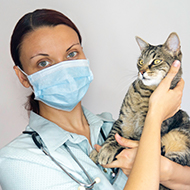
New guidance to replace current emergency guidance.
The RCVS has published new COVID-19 recovery guidance for the UK veterinary profession, aligning with the UK governments' intention to ease the country out of lockdown between now and mid-April, depending on a number of factors.
The new guidance, which will gradually replace the RCVS' current emergency guidance, aims to help veterinary practices begin a phased return to near-normal operations, subject to a number of provisions.
Provided the government's plans remain in place, practices across the UK will be able to use their own professional judgement to decide which services to provide, whilst still maintaining biosecurity and social distancing measures.
Practices will no longer be expected to provide only essential services and the College's COVID-19 flowcharts will be removed.
The College is, however, keeping the right to remote prescribe in place, but only where there is no suitable alternative and still subject to certain guidelines and requirements.
RCVS president Mandisa Greene said: “Whilst I sincerely hope that we are at last beginning to see light at the end of the tunnel, if there is one thing we have learnt, it is that things can deteriorate rapidly if we don’t all continue to play our part and follow all relevant guidelines.
“I therefore urge my colleagues to continue to use their professional judgement and think very carefully about their gradual return to more normal working patterns over the coming weeks and months, according to their individual circumstances and the best interests of their teams, clients, and the animals they care for.”
The RCVS COVID-19 Taskforce has also announced that changes made in response to the pandemic will now be reviewed and decisions made as to whether to retain, amend or reverse them.
The BVA has also published guidance for practices on working safely as lockdown restrictions are eased, available on the Association's website.



 The RCVS has announced a new version of its 1CPD mobile app, with enhanced features for veterinary surgeons and veterinary nurses to record their continuing professional development.
The RCVS has announced a new version of its 1CPD mobile app, with enhanced features for veterinary surgeons and veterinary nurses to record their continuing professional development.